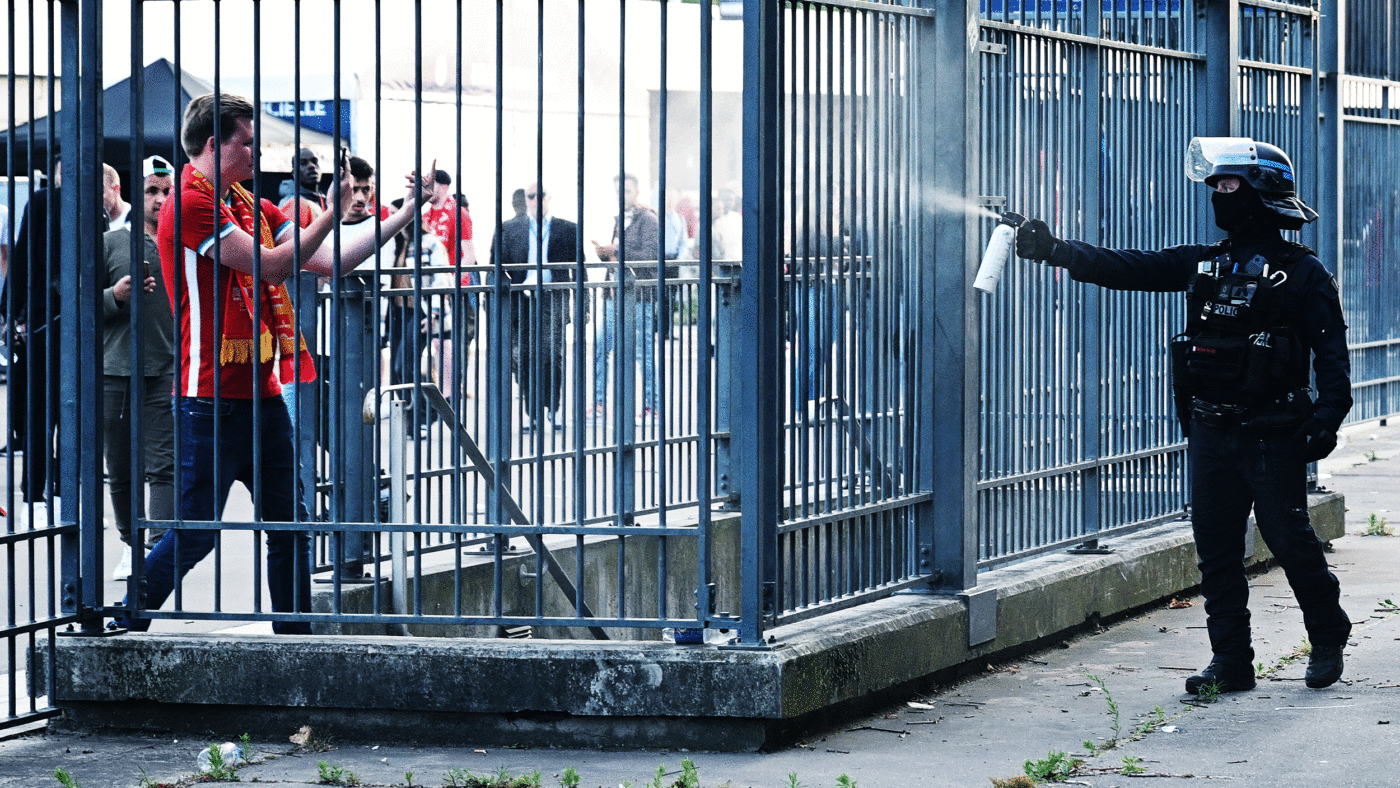Football history is rife with stadium incidents, but few of them end up compromising a national government. That was the case, however, with the chaos at the Champions’ League final in Paris on 28 May. France’s conservative opposition denounced a ‘scandalous affair’; accusations of ‘state lies’ flew; far-right leader Marine Le Pen called on Interior Minister Gérald Darmanin to resign; Mr Darmanin and Sports Minister Amélie Oudéa-Castéra were hauled before Parliament; the outcry may well hurt Mr Macron’s centrist alliance in this month’s general election.
On the face of it, the fracas may seem overdone. What happened at the Stade de France was a disgrace: fans with tickets were unable to enter the stadium, pepper-sprayed by security forces and attacked by local gangs on their way out But no-one was seriously hurt –unlike the Heysel or Hillsborough tragedies of the 1980s, which resulted in dozens of deaths and for which organisers and police, not cabinet ministers, were blamed.
The reason Mr Darmanin and Ms Oudéa-Castéra are now in the firing line is not safety and security failures at the Stade de France, but their attempts to minimise them. The interior minister immediately pointed the finger at Liverpool fans: 30-40,000 flooded the forecourt ‘either without tickets or with fake tickets’, he claimed. The sports minister echoed this version of events: ‘When there are so many people at the entrance of the stadium, some necessarily will try to force their way in.’
Holes in this narrative quickly emerged. There was no sign of tens of thousands turning up without valid tickets – only 2,800 fake ones were recorded at the gates. Eyewitness accounts and social media footage showed that the shambles was the result of genuine fans being channelled towards understaffed turnstiles combined with an inadequate police deployment.
When questioned by senators a few days later, Mr Darmanin acknowledged that ‘things might have been better organised’ but insisted that huge crowds of gatecrashers were chiefly to blame. The response has been a boon for the xenophobic right: a woke government was accused of trying to hide the breakdown of law and order in immigrant areas – including Seine-Saint-Denis, where the stadium is located. Éric Zemmour, a populist who had been smarting from his failed presidential bid, made headlines by saying ‘Seine-Saint-Denis is no longer France’.
Why did cabinet ministers stand by a version of events that was demonstrably at odds with the facts? Why did they stick their necks out in the first place? The answer to these questions lies with a well-known fact of French political life: extreme centralisation of power. The interior minister, unlike Britain’s Home Secretary, heads a national force. Not for nothing is he (or very rarely she) known as the premier flic de France: every cop in the country is ultimately accountable to him. Mr Darmanin has every reason to be defensive to the point of paranoia: any high-profile policing cock-up is down to him.
Ms Oudéa-Castéra too is the victim of her own outsize brief. Cross-Channel comparisons, once again, help understand why. The two governments are equally prone to get involved in major sports events, but the UK’s is careful not to micro-manage them. Preparations for the 2012 London Olympics, in time-honoured British fashion, was farmed out to a quango-style committee that was satirised by the series Twenty Twelve. On top of making for good comedy, the approach had the advantage of ensuring that to this day no-one knows who was ultimately responsible for the Games.
Ms Oudéa-Castéra enjoys no such protection. Her official title says it all: ministre des Sports et des Jeux Olympiques et Paralympiques. A political novice, she is expected to lead from the front in organising not only the 2024 Paris Olympics but also the 2023 Rugby World Cup. The events at the Stade de France, which came just eight days after her appointment, cannot possibly be laid at her door. But after any organisational debacle, all eyes will naturally turn towards her. Just as naturally, she will look for scapegoats.
The wider problem with France’s top-down, personal style of government has been acknowledged by President Emmanuel Macron himself. In 2017, he launched his first term by promising to resolve all the country’s ills in a ‘revolution’. But it turned out that some of those ills could not be resolved quickly. Mr Macron’s Superman attitude meant that, whatever his achievements, he was a magnet for discontent. Just over eighteen months into his presidency, he caved in to populist ‘gilets jaunes‘ protests and has been stuck in crisis-management mode ever since.
Having belatedly accepted the age-old truism that absolutism breeds insecurity and impotence, Mr Macron has pledged a more collaborative attitude for his second term. But as the travails of his interior and sports minister suggest, entrenched institutional habits die hard.
Click here to subscribe to our daily briefing – the best pieces from CapX and across the web.
CapX depends on the generosity of its readers. If you value what we do, please consider making a donation.


